Fast Forward Maine Podcast
Fast Forward Maine Turns 100
Podcast: Play in new window | Download
Subscribe: RSS
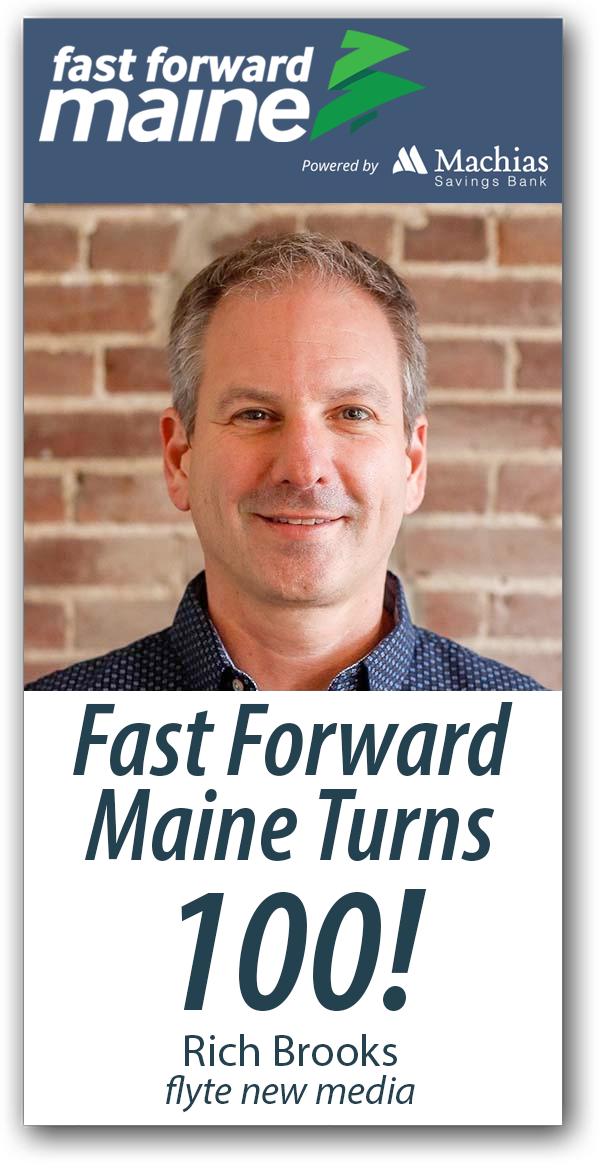 As we publish our 100th episode, Rich Brooks looks back on lessons learned, how to grow your business here in Maine, and gives one last Fast Take.
As we publish our 100th episode, Rich Brooks looks back on lessons learned, how to grow your business here in Maine, and gives one last Fast Take.
Thanks for tuning in to the 100th episode of Fast Forward Maine. This episode is a little different than the 99 that proceeded it, in the fact that there’s no episode to follow. This is our last episode, at least for now.
However, this is not the first time I’ve recorded the last. And that’s not because I thought I was going to quit after episode 50 or 75, I actually already recorded the hundredth episode. And no, I didn’t lose it. I didn’t forget to hit record. I just did the entire episode, spilled my heart out. And at the end of it, I realized that every episode of Fast Forward Maine is about helping Maine business owners and leaders grow their business. And I really hadn’t done that in episode one. All I did was thank the people who helped me get to episode 100. So I decided to re-record this, with the goal of sharing some advice on marketing and business that I hope is going to grow your business here in the state of Maine.
Before I get to that though, I kind of have to lay a little bit of groundwork and explain how and why this podcast was created in the first place. And it really starts with my friendship with Yury Nabokov, who was working for Machias Savings Bank at the time. Yury and I connected over a series of events and became friends, in part because he was such a big supporter of what I was doing with the Agents of Change – which is an annual conference and another podcast that I run – which is all about digital marketing. And Yury felt that the bank should really get involved with our conference and just support it and help promote it in any way they could.
He apparently got a bunch of people to agree with them. And for several years Machias Savings Bank was our big sponsor for the event, and one of the reasons we could bring in some really big-name speakers. After a while, however, Machias decided that they wanted to focus on their own business, which makes a lot of sense. And they were really well-known up north in Maine, but less so down here in Southern Maine, they were kind of expanding into this area. The other issue was a lot of people seem to know them on the retail side, but didn’t necessarily think of them as a business bank. And they’ve got great businesses bankers. Flyte new media, my company, is a customer of Machias Savings Bank and we absolutely love them, and they’ve been a fantastic bank to work with. By the way, their sponsorship for the show actually ran out at episode 97, so I’m just saying this and sharing this from the bottom of my heart, they are an amazing partner and I really enjoyed working with them over the years.
Anyway, they wanted to pivot a little bit and they wanted to take their attention off of marketing or off of talking to marketers and onto business owners, which makes a lot of sense, that’s who their audience was. And so Yury and I kind of pivoted and we said, well, what if we kind of create this new brand that’s all about helping Maine businesses grow. And at the time we said we’ll do in-person events, and we’re also going to do a Facebook group. After a little bit more discussion, we both realized we hate Facebook groups. We don’t hate Facebook groups, we hate being responsible for Facebook groups. We both tried them in the past, they weren’t really our cup of tea. But we were both passionate about podcasting, and so we shifted to that model. We do in-person events and we would do podcasting.
And after a few early events, we realized that we needed a name for this project that we were working on. I previously told Yury I bought a domain name a decade ago called ‘fastforwardmaine.com’ and some associated social media handles, but never knew what to do with them. It was actually Yury who suggested that this was the perfect opportunity that we were trying to move Maine forward, that we were trying to move the business economy forward through education. And what better name than to call it ‘Fast Forward Maine’. Thanks to Yury, that became the name. After that I reached out to Josh Fisher, who I knew is an amazing illustrator. And he had actually done basically all the artwork for the Agents of Change and asked him this ridiculous task.
Could he make a logo out of the state of Maine? Like the state of Maine kind of looks like the play button. We were going to be Fast Forward Maine. Maybe he could do two states of Maine and it would look like that. He did try it. But luckily for me, he also tried some other ideas. Including putting two pine trees together, which ultimately became our logo. And I absolutely love it. And it’s going to be one of the things I miss the most about doing Fast Forward Maine is I always thought his logo work on this was fantastic and just absolutely loved it. He also did another version with two mountains that I thought maybe at some point in the future, we’d bring out, too. But I guess we never got around to it. Anyways, a big thank you to Josh for this. As well.
Now we knew in advance that this podcast was never going to have a huge following. First of all, most podcasts don’t unless you’re Joe Rogan. And honestly, I just don’t want to go down that path right now. Not only was our podcast more for a niche audience, we were already focusing our attention on business owners in the state of Maine. And then when you throw the additional filter of podcasts listeners into that, I mean, how many downloads were we really expecting to get at any one time? 500 was probably going to be the peak, but we were all really passionate about it. And if you can get in front of 500 business owners in the state of Maine, that’s pretty impressive. So we were just looking to create the best quality content and talk to the most influential business leaders here in the state that were going to help our audience grow their businesses. And really, we accomplished that.
We talked to great minds from the Maine SBDC, from SCORE, from ACE Consulting. We talked to business owners, we talked to financial people, we talked to HR people, to PR people. We talked about people who were involved with workforce issues. We talked to Yellow Breen over at the Maine Development Foundation. There were just so many brilliant minds. And one of the things that’s nice about podcasts, is you the listener right now can go back and check out all those episodes. That information, for the most part is, very evergreen and it can continue to help grow your business over time.
When we first started, we actually started in Machias Savings Bank. Honestly, they were so supportive. It wasn’t just sponsorship money, they gave us a studio to record it, and they gave us all this high-end equipment. They gave us Cody, our sound guy. They supported us in every way you could. There was a time you would walk into Machias Savings Bank branches, and you could actually see on the screens this week’s episode, the topic and the guest, for the Fast Forward Maine episodes. Just really a lot of support. Yury and I had a blast co-hosting the show. We had different approaches to each episode, to each guest. Yury is very enthusiastic and upbeat, and I’m not saying that I’m downbeat, but I have a few more years on me. Maybe not the same level of enthusiasm and earnestness that Yury would bring to the microphone, but I enjoy interviewing people together especially at the beginning where all three of us, when the guests would get into the same room and be able to look eye to eye, and Cody videotaping the entire thing for later use.
I should actually pause for a second. That was true, pretty much from episode two on. But the very first episode of Fast Forward Maine – and there’s a photograph of this on the web somewhere – is me and Yury realizing that we only have one microphone and a set of earbuds. Literally sitting side by side in my office, with one earbud in each of our ears, talking into the microphone. Not exactly ideal podcasting situation, but we made it work. And luckily right after that, we had the opportunity to use the equipment over at Machias Savings Bank’s Portland branch, and we kind of upped our game from there on out. But just had a great time interviewing and learning from all these great minds here in the state of Maine.
But here’s the lesson, I guess, that I want to share with you today. Because I’m sure a lot of people would say, “Oh, he stopped doing the podcast. Obviously, that’s a failure.” And I’m sure you could look at it that way, but that’s definitely not the way that I’m going to look at it. In fact, there are so many wins that I had personally as a business owner here in the state of Maine, from the show, the number of people I met and connected with, and the opportunities that came my way. Including opportunities for my company, flyte new media, and some of the jobs that we got from the connections that I had. And other opportunities to go on other podcasts and to do other speaking engagements, and just to make more connections in the business and networking here in the state, were all really valuable things for me as a business owner and strongly recommend that you might consider that for your own business as well.
But the bottom line is that in our business, we need to take a look at what’s working and what’s not. Fast forward Maine the podcast was working in many ways, but it’s time consuming to do a podcast correctly. My time alone was well over an hour a week, which may not seem like much, but that’s an hour every week. And we were also using other resources. We were outsourcing some of the post-production. We were getting it transcribed. We were having it put up to the website. All in all, each episode would take four or five hour’s worth of work, which certainly adds up when it comes to costs. And even just for me, it was probably more than an hour a week because I spent a lot of time finding guests, finding their schedules, doing a pre-interviews, and then getting them back onto the schedule for a longer interview. As much as I loved it and enjoy talking to people, it was taking away from some of the other things in my life. And as a business owner, you only have so many hours in the day and so many hours in the week.
Besides the Fast Forward Maine podcast and the webinars we were putting on, I also had the Agents of Change, which right now at this point, we’re up to 424 episodes on that. And that’s a podcast that generated a lot of business for my company, flyte. Plus there was flyte itself. I was running that company. And it just became one of these things where I was being spread a little bit too thin. And so when the sponsorship came up for renewal, I had an honest conversation with the people at Machias, and they felt it had served their purpose, and I didn’t really feel like I wanted to go it alone at this point. That I wanted to put my efforts towards the Agent of Change podcast, hopefully towards the conference, and definitely towards flyte. And that’s what I did.
It pains me that I’m not going to be doing these interviews and talking to other Maine business leaders and consultants and experts. But the bottom line is, I can always bring this back. I can always come back at some point in the future, either by myself or with another sponsor, and do more episodes. And that’s okay. But I think the important thing is, as business owners and as marketers – because I consider myself one, too – we have to try new things. And sometimes these things last as long as our business does. And other times they last only for a few years or only for a few months. And sometimes they’re utter failures, but at least we learned something from it.
I look back on Fast Forward Maine the podcast as an absolute success. The numbers may not show that, but the bottom line is, I know that we touched a lot of people. I know that we improved businesses because I’ve heard that from some people who’ve come up to me, either in person or virtually, and told me that they really liked this episode or this expert or this topic. And that means a lot. And I hope you got something out of listening to the podcasts, the episodes, over the past few years.
Two things that Yury and I instituted right from the beginning. The first thing was a question we would ask all of our guests. And the question went something like this: “What one thing would you change, if you could, to improve the business ecosystem here in Maine?” There were no right answers. And the interviewee did not necessarily need to respond in any way that was about their business or their industry. In fact, we told them to say whatever is important to you. And we got all sorts of ideas. Some people wanted us to lower taxes. Some people actually thought we should increase them. Some people thought we should put money into the colleges, especially the community colleges. And other people thought we should invest more in the trades. One answer that kept on coming back over and over again was the idea of improved connectivity and broadband.
Now I’ve given my answer before, because I’ve been the guest on the show once before when Yury interviewed me. I honestly don’t remember what I said, but I’m actually going to agree with, I think probably the most common answer that what I would change if I could is connectivity for all Mainers throughout the state, north and south. After COVID, with so many people wanting to move to Maine but just they’re not being as many opportunities, and so many businesses kind of being strangled by the fact that they don’t have good connection to the internet. I think that’s one of the biggest things we could do that would have an impact, not just in Southern Maine, but throughout the state. And that would be probably the biggest game changer that I can think of.
The other thing that we would do at the end of each episode is each give our ‘fast take’, our big takeaway for this week’s episode. As I look back over the past hundred episodes, here’s my ‘fast take’: That there are so many free and affordable resources for business owners and entrepreneurs in the state of Maine. It’s crazy. I’ve heard plenty of people complaining about the taxes are too high, or there’s not enough young people to work in the state, or this regulation or this tax is too much. I don’t believe any of it. When I look at the state, I’m not saying it doesn’t have its problems, I’m just saying that there are so many organizations from SCORE, to ACE, to the Small Business Development Centers, to the Small Business Administration, to MTI, MITC, all of the Kickstarter programs that are throughout the state, all of the Angel Investing that’s in the state. There are so many opportunities to grow your business here in the state. So many resources that are available to you. And hopefully by looking at this show and listening to the show and looking at past episodes, you’ll see the wealth of resources that are out there.
So if you are struggling, whether it’s struggling with finances, or trying to find the right people, or trying to get the word out from a marketing standpoint or trying to increase the conversion rate at your store or your website, we’ve got resources here through the podcast, but we’ve also interviewed people who are out there ready to lend a helping. My ‘fast take’ is that there’s plenty of resources to grow your business here in the state.
It has been an absolute pleasure and honor to be behind the mic at Fast Forward Maine for the past 100 episodes. Please, if you haven’t yet, check out a lot of the other episodes, there’s some really great content in there. Other than that, I’ll say goodbye for now. But who knows, maybe I’ll see you again in episode 101.
Podcast: Play in new window | Download
Subscribe: RSS
How to Attract The Right Employees in Any Economy – David Ciullo
Podcast: Play in new window | Download
Subscribe: RSS
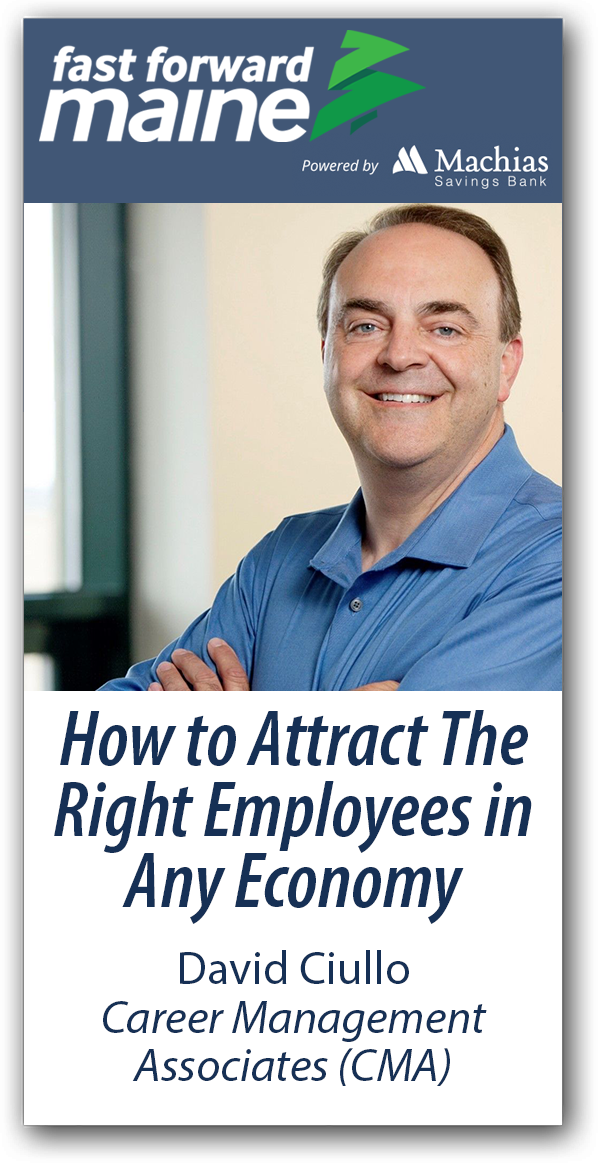 Finding qualified employees is incredibly difficult right now, especially when you see every other company looking to hire as well. How can you stand out as an employer? How can you attract a workforce? How can you reduce the friction during the hiring process? We tackle all that and more in this week’s episode.
Finding qualified employees is incredibly difficult right now, especially when you see every other company looking to hire as well. How can you stand out as an employer? How can you attract a workforce? How can you reduce the friction during the hiring process? We tackle all that and more in this week’s episode.
Rich: My guest today is the CEO of Career Management Associates (CMA), a New England HR services organization located here in Maine. He’s also an HR thought leader, speaker, and MC, as well as the talk show host and owner of the HR Power Hour, a national radio show and available in podcast form on your favorite podcasting platform.
He currently serves as a member of the Maine State Civil Service Appeals. He’s also on the board and current past president of the Human Resource Association of Southern Maine. He currently serves as HR liaison and is on the board of IFOB, Institute for Family Owned Businesses, here in Maine. As well as serves as vice president on the board of Northern New England Association of Personnel Services. It’s amazing I was even able to squeeze into his time just to get him on the show.
Prior to CMA, he had over 25 years of experience as an executive for large retail corporations, including American Eagle Outfitters, Pacific Sunwear, and Design/Levi Strauss. With all that experience, let’s jump into hiring in a competitive environment with David Ciullo. David, welcome to the podcast.
Dave: Thank you, Rich. I appreciate being on the show, and I’m glad you didn’t run out of breath with all that.
Rich: Really, it’s going to help me practice my underwater breathing. So David, how did you first get into HR and recruitment? What was the draw for you?
Dave: I got to tell you, it goes way back to the fact that I’ve always tried to help people. Even when I was in the retail world for 20 plus years, you have hundreds of employees that work with you, and I just got asked all the time about employees and thoughts on HR, and it’s part of what I did every day. When you have 800 employees or 70-80 locations, it is your life. It is all about the people, it’s not really about the product. The product will sell itself. It’s about the people and how they operate. So it just became natural something I really enjoy and love doing.
Rich: All right. Now as we record this interview, we’re in the middle of the great resignation, and it seems like every store has helped want it sign in the window. What’s your advice for finding talent in an environment like we find ourselves in right now?
Dave: Hiring today and finding talent today as I call it, in turbulent times, is something that employers have to remember is about themselves first. Really. What is it that your brand stands for? And you as a marketing guy, Rich, know that when I’m talking about brand in this particular case, I’m actually talking about you leader’s brand, your management brand. What did they stand for today? More than ever it’s about how you treat the people, how you take care of the teams and how you treat them on a day in and day out basis. Because people can walk out the door as they are each and every day.
I always say, people say to me, “Oh, great resignation.” I said, “No, it’s really great redistribution.” People just going from one place to somewhere else. Sure, some people are leaving the market, entrepreneurship is up more than ever. But the reality is people just relocate someplace that isn’t where they’ve worked for a while, where they are treated in a way that is respectful and professional. But it’s about the leader’s brand sites today, like Glassdoor. The Glassdoor effect, as I call it, has really put the spotlight on the leader that is working for you. And you and I both know the reality is the number one person that impacts an employee’s life is their manager, their assistant manager, the leader, the director, whoever’s there. I do outplacement. I do obviously a lot of HR work. I do a lot of executive coaching. I do a lot of HR outsourcing for companies. And certainly my company, CMA, does that. And rarely do I hear anybody say the company is terrible. What they say is, the people I work with are a problem. The people who manage me is a challenge. They just don’t understand me. And in the old school days, right? Not that we’re old, but in the older school days, people used to say you have to work with the boss in charge. You know what, those days are over. It’s really about managing up and down and having neutral respect across the board. So first it’s about making sure your leaders and your managers are doing the right things. That’s the first thing you have to do when you talk about branding for your organization.
Rich: All right. So before we move on, let’s just touch on this for a little bit, because it does sound like it’s important. It also sounds like something I’m not going to be able to fix overnight. So if I find that I have a problem either because I’m self-aware enough, or because I read the reviews on Glassdoor, or words come back to me that people are leaving because of the people that they have to report to. What are some of the things that I can do put in place so that I’m going to have a better hiring brand down the road?
Dave: Yeah, the reality is, first get some help. Obviously gets some support out there, find out what the challenges are. Do a 360 evaluation with the people that you do have, ask them questions. What do I do well? What don’t I do well? This is a moment in time when you need to take your pride and put it on a shelf. Ask some basic questions, learn about you as a leader. If you’re an owner learn about the leaders who have working for you, find out what exactly it is that drives them and how they manage and truly run the business.
And the other part of that is to remember, it’s no shame to get help. In the old days we used to say, oh my gosh, you can’t get any help today. I really encourage you to get it and then let them understand that they can go out and change and tell people they’re going to change and be held accountable for that change and say, “Look, in the past I certainly maybe didn’t treat you the way I should. I’ve learned, I understand I’m going to work with you. Let’s collaborate. Tell me what I could do to help you have those open-ended conversations.” By the way, I’ll tell you, sometimes it’s hard. Sometimes it’s a lot to swallow, but the reality is if you want to fix it, you got to do a one person at a time. This isn’t something you can do in an email, a text or a.
Rich: No, you can only destroy your reputation that way, you can never fix it. You mentioned the phrase ‘getting help’ two or three times. Are you talking about getting outside help for the leadership and management positions within the company? Or do you mean something else?
Dave: I actually mean both, internal and external. Look, if you can’t afford it and you can think that it’s, you need assistance from the outside to make that work. That is an effective tool. I know, I do it for a living. But the reality is there’s self-help online tools that can be looked at for basic understanding and learning and leadership development. We certainly know there’s plenty out there. Take the time to get the foundation, talk to colleagues. Maybe you have a mentor you can go talk to, or if you don’t go find one, somebody who’s helped you in your life. Go have a conversation about what it means to lead, what it means to be a good manager. What you really need to make that work. Take that time, be self-aware, and make sure that you have the ability to listen and critique yourself.
Rich: I’ve read in The Wall Street Journal, The New York Times, and other magazines, that a lot of companies are streamlining their hiring process. Do you think this is a good idea? And if so, what do you recommend doing to streamline that process?
Dave: No. It’s funny you bring that up. I’m doing a lot of conversations with companies and organizations about this. And the streamline process is really in two ways. The first is, what’s the timeline or the process you go through for attracting and gaining? What do you really need from somebody, just like in any sales process? And by the way, hiring is a sales process. You’re hiring them, they’re selling to you, and you’re selling to them. The first is, are you current? Can somebody really apply to your organization and get an interview in a very short period of time? I would give an exercise for anybody listening today. If you have a company or you work for a company, go try to apply for your own company right now. Go try. I wish you the best.
I’ll give you one more trick. Try from your phone. Let’s see how long it takes you to apply for your company on a phone, or if you end up throwing the phone into the local trash can by the time 5, 6, 10 minutes goes by. By the way, it won’t take that long, it’ll take about 30 seconds to a minute. If you can’t apply to an organization under a minute or two minutes at the latest, you’re taking too long. That’s the truth. So it’s streamlining that process. But really, what do you need? You need a name, you need a phone number and a way to contact them maybe by text, maybe you need a carrier information. Maybe the thing they’re applying for and a place to drop a resume in. Or even if it’s not time for a resume, let’s just at least get a quick bit of information of who you are.
So you need I the reality is – I said speed, because the speed is of the essence and time is of the essence – you should probably contact them back within about two hours. Now, some on this, on two, on this, think about it. You have their attention span for a very short period of time, because if they are looking, they’re going to apply at the next place and the next place and the next place.
And it’s a race to get back to you of who is going to hire, especially. You just said, every place says hiring signs. If I see a good candidate and I wait an hour, two hours, I probably lost them because there are companies right now, quickly scoffing people up. So that’s the first step, right? That’s the first thing on the tactical side.
The second thing is really on your interview process. I still talk to companies that take 2, 3, 4, 5 weeks to hire somebody. Depending on the role, depending on the level, depending on what is needed. I certainly understand some of that, but there’s a lot of ways you can cut that down. Why, for example, can’t you just immediately contact them on the phone and say, you got time to FaceTime right now for first initial properties. Why can’t you have an immediate interview with them right on the spot, why do you have to wait? Technology is there making it work for you? And then get the managers lined up, HR lined up, everybody lined up so that they have slots available. So you can interview right away. You should be able to wrap it up in a week, maybe two at the latest. If a low level, you should probably have it done in two days. That’s not to say you shouldn’t have background checks, that’s different. But that’s after you do the hiring.
Rich: All right. People at home can’t see the look of incredible incredulousness on my face right now, because I know at flyte we have a painfully slow hiring process. And thankfully, we haven’t had to hire anyone recently. We’re full up. And we’ve been good at retaining talent.
Okay, enough of an advertisement for my company. But when I think about what you’re saying, part of me wonders, is that advice for today? Whereas maybe in the future where companies have the upper hand where we can take our sweet time. Because the old phrase is, fire quickly hire slowly. So is this really just timely advice, or is this eternal advice?
Dave: So I would answer that with, it is certainly timely advice and eternal advice. Because the attention span of the newest recruits in the marketplace today is much shorter. The world’s changed. It’s all online and we got to get in front of them faster. Now look, could we have a little extra time if the market was a little different? Sure. Of course. But I am under the belief that if they’re really good, they’d go on and get hired up. I don’t care if it’s an employer’s market or an employee’s market, great talent will be found and will be hired and will be scoffed up quickly.
And I think back a few years – and that really wasn’t that long ago, 2019 – when we were hiring for on the search side of the CMA business for COO. And we had a couple of people that applied for that position. And the organization was trying to make the decision on whether they were going to hire them. I think we were three weeks in at that point. And the reality is, the company who we were working with said we’re going to need a little more time to evaluate maybe a couple of other candidates. And we went and we talked to him, and he said, “I have three other offers on the table right now.” So are they willing to move, or are we going to move on? And that’s the reality today is good talent, top tier talent in any position at any level, will find a home pretty quickly.
So I’ve argued that the process we’re talking about should really not just be for today. It’s effective, but it should be for long-term. I agree with hiring slow, but it doesn’t mean that you have to take two months. Hiring slow could be two weeks.
Rich: The other thing that I have to question, or that I have a question about, is how does this impact based on the level that we’re hiring? I can understand if I’m UPS and I’m looking for people just to be in the warehouse. And I’m not dismissing how poorly I would do in that job, but I just need some bodies to throw at the problem. Yes. let’s just hire people, background check, but that’s it. Versus maybe a director of operations or a higher-level position, obviously there’s got to be more time that’s put into that position, right?
Dave: So here’s the thought process on that. And so is that going to take more time to fill? Yes, because you’re going to have less candidates available in the job market for it. In a low-level position, you have X amount of people available that could do that job. But let’s look at a Director of Marketing, for example. There’s only X number of people, a smaller amount that are qualified for that job. I’m not saying applying, but qualified for that job. That’s going to shrink the pool that’s coming in for those types of roles. Right? Why should it take longer to hire good talent then? I would ask the question, is it more valuable to get them in and started? Do you have a problem? You have an empty slot every day without a person in that slot. Why are we waiting three weeks? Is it just because we can? Is there some magical formula that if you take an extra week to make a decision, you’ll make a better decision? I think I would argue that has been proved to be false time and time again. Now, if you need to do background checks, you need to do reference checks, that’s all fine. But that should be done post offer anyways.
So the reality is, why should it take more time? Getting on the front end to get the number of candidates, sure, that is going to take more time. But I don’t see any reason why we can’t do the process quicker. And it has been proven during this timeframe right now, we can get just as good top talent in a faster pace. Why would we not take advantage of that for business services later?
Rich: Yeah. And it brings up a point you mentioned earlier, treating this like hiring is sales. And if a sales lead comes into our inbox, I’m on it usually within instantaneously of me noticing it, usually within 15 minutes of somebody filling it out. But we collect Job applications for two weeks before we even deal with them. They just go into a folder, and I’m sure we’ve lost some good, potential people because of that. So it’s an excellent point.
All right. So we’ve shortened the hiring process. I almost want to take a step backwards because before we even get to that process, there’s the whole idea of increasing the pool of applicants we might be speaking to. Any suggestions on how do we increase the size of that pool?
Dave: First of all, you’ve got to remember that the days of what I call and has been on advertising all the time, ‘post and pray’, is pretty much over. You have to be everywhere. And boy, that has changed over the world today, from social media to the big boys like Indeed and LinkedIn and some of the others. The reality is you need to be everywhere to get the number of applicants you need.
You know, the number one place to get great talent is in who you know, and then the people that work for you who they know. There’s so much value to finding through contacts, through organizations, through associations and other places, to find the top talent that exists out there. Sure, you can go on the web and you look up anybody, any place, anytime, anywhere, whether they are good or bad, you won’t know. But there’s something about talking to somebody who you already have some sort of relationship with to find out who they know that makes a huge difference in the ability to hire talent and find great talent.
So the reality is you need to be everywhere. You need to be on social media. You need to be on the big boys like Indeed and LinkedIn. But you also need to use the references and the resources you have to go out and find top talent. So I would tell you it’s all of the above and more. And I don’t think that last piece, people are afraid sometimes to call people. Okay, then have a recruiter do it for you. And I’ll tell you, I say that not just because we do that work, it’s because, would you cut your own hair? Maybe during the pandemic you would, so I’ll take that back.
As a matter of fact, when I went to the barber after the time I went, and the stylist said to me, and I quote, I said, “How’s the haircutting?” She goes, “We’ve seen some very interesting things since we’ve reopened. Do you go to people that know what they’re doing to find great talent? Use that expertise. If I was going to be hiring flyte new media, I wouldn’t hire them for finding talent. I’d hire them for marketing. If I was going to go find another organization, you’d hire us for finding talent and HR, you wouldn’t hire us for marketing. So go and find the great talent. We’re not going to be marketers. You’re not going to be HR. So go find that talent because in the long run, it’s cheaper. In the long run with time, energy, and using the right process to get the right person in place.
Rich: I have heard both from friends as well as news stories, that a lot of people left their job when suddenly the company said we’re all moving back into the office. They’d gotten used to working from home. I’m wondering if working from home or hybrid options are popular benefits these days that are attracting new hires? Or maybe what are some of the benefits that we could offer people that would make our company seem like a more attractive place for them to settle?
Dave: Boy, this is a hot topic, Rich. Big, big topic about, do we want to be home, do we not want to be home? Who wants to be home? And I think you could make an argument that this really comes down to the person. Some people have found out they go home, they are not happy. They want to go back to work, and vice versa. Some people have gone home and go, I never want to go back to work. So there’s really been this mixed bag of emotion. And some people say they could do both and they just don’t care. That’s fine, too. There’s always been an individual choice, and most demographic experts I’ve spoken to have said that we’ve sped up the cycle about 10 years. This probably would have happened over a 10-year process, but we did it in about one to two years.
Here’s the deal. There are benefits to organizations that can do it. Manufacturing, maybe you can do it in your accounting area, or you can do it in some of the other aspects. But until you get one of the big CDC machines at your house and move that product and medical around, it’s not going to happen. Hospitals, same thing, we’re not going to do those things. So it depends on the organization what you can and cannot do. It saves money, it saves time. You don’t have office space and overhead. There’s a lot of different aspects to it. But there are disadvantages to it, right? You don’t have the same close contact to be as innovative. Technology is great, but it’s not perfect yet. It’s certainly better than it was only two years ago. And employees that want to do it feel empowered, because they’re home and they’re doing their thing and they’re not being potentially micromanaged. On the flip side, you and I both know as owners, there are some people that really should be micromanaged and should be trained and developed to help them through the process to make it work for them. So I’d love to say there’s a one size fits all answer here, but there really isn’t.
Let me give you one other thing that was told to me, a story which I thought was really powerful. I was on our zoom with four people, and it was an attorney, there was a CEO, there was myself, and there was one of my colleagues, Ashley. And we were talking about this very conversation. We were having a conversation about the fact that work culture must be impacted when we’re home versus at work. And how are you going to keep the culture and the challenges with all that. And you had the CEO and the attorney, and even myself, having this dialogue about it. And she was quiet about this. And so at some point I recognized that she wasn’t engaged in the conversation, I go, “So what do you think, that it affects the culture? And there was this long pause, and she goes, “I just think you guys haven’t thought of the fact that there may be a new definition of what ‘culture’ is. Like, I have no problem working from home. I am just as engaged to your organization if I was there. But you guys are not talking about that as part of the culture as much.” And that was like – bing – eyes open. And we are going to have to look at how we define what it is, and then tailor it to the individuals as they come in or out of the office. And in some times it will work. Sometimes it isn’t going to work. And I think it’s still open as to the long-term effects of it.
Rich: If somebody is really struggling to fill some critical roles in their company at every level, what are some kind of almost like guerrilla marketing approaches to this? I’m thinking about tapping retirees, I’m thinking about talking to employees about do they have friends or family that might be looking for some work? What have you seen out there when we just have to throw people at the jobs to make sure that things are getting done?
Dave: You said two of them right off the bat, right? Certainly friends and family is an important one, because you know the person that’s there and you would hope that they’d want to bring people in that are good. Certainly retirees, veterans are another place. There’s some great work being done in the Maine area and across the country, by veteran’s groups to get workers that are coming back from and leaving the military. We are seeing work with people that are getting out of prison and are being brought back into the workplace for non-dangerous crimes. People with disabilities, another area to look at. They don’t get as much looked at as they should, to tell you the truth. That’s another area to focus on. Immigrants. We had a lot of people coming in from Afghanistan and other places. And there are places out there we can get the help with the language, and if you can teach them certain ways. So there are plenty of places to go look at that. It’s just a matter of what are you willing to do as an organization to adapt and modify so that you can accommodate that. But if you are quote unquote, ‘desperate’ enough that you need the people, you can find talent, you just have to be willing to adapt to make it work.
Rich: You brought up Glassdoor earlier. And for those people who may not be familiar with it, I believe it’s just basically current and past employees talking about their experience at different companies. It tends to be more for medium-sized to large companies, has been my experience. At least I’ve not seen anybody leave a comment about flyte new media to date. Is this something that as an employer we should be paying attention to and responding to people’s complaints on Glassdoor, the same way we should be doing so on TripAdvisor or Yelp? Or do we just ignore it and hope it goes away?
Dave: No, you’ve got to be open to what’s really happening in your world. That’s not even a question from that perspective. Look, I will give you an example. My niece who just turned 22, she just graduated from college last year and I was helping her in terms of what she’s looking for a job before she graduated. And I made this comment about a couple of companies that were in the area where she was. And she goes, I’ll check them out. And I said where are you going to check? She goes on and she gave the list, “I’m going to go at Glassdoor, I’m going to go to LinkedIn, and I’m going to go to social media and see what people say about them.” And I said, you recognize, of course, that nine out of ten comments are probably negative. And she goes, oh, I know that. It’s just like looking at any of the other advisory stuff, there’s always reviews and they’re more heavily negative than positive. She said, I recognize that it’s no big deal. What I’m looking for is consistency in messaging. And in other words, if it’s a terrible place to work and it’s the same type of reason all the way through, then it probably is true. Or is a supervisor named John, and John is stated throughout many different reviews and different ways, it’s probably true. And she says, I’m just not going to work there. And I said, what if they have a good salary? And she said salary doesn’t make up for the fact that they’re a jerk.
Rich: Fair enough. At what point should we consider hiring an outside recruiter to help us fill key positions in our company?
Dave: Yeah. So I go back to what I said a little bit before. This is one of those situations where, what are you really looking for? What type of talent are you really looking for? If you’re looking for top tier talent, probably they’re not looking on the job boards, they’re probably not on Indeed. They’re probably not anywhere from that perspective. And just if you were trying to do something and trying to find a particular item, you would go where that particular item is truly known. That’s what recruiters do, we live in that world. We understand where the top talent is, and we have the contacts all across the country in many places, and we certainly have that as well to find that talent. We also hear, do you work in that industry, in the medical industry, in the manufacturing industry? I would say that the answer is probably yes, but the real answer is the process is the same, no matter what. A person is still a person, it’s not necessarily about the industry. Does the recruiter really understand you? Does the recruiter really understand your organization? It doesn’t understand how it works? Does it take the time to either go there, in some cases, and really get to know what you do? Or in other ways, ask the right questions so that they truly understand and make a profile of the person they’re looking for. That’s when it benefits most, when you have a super important position, typically over a certain range for your organization and you want the best out there.
The other part of trying to find the best takes time. And I will tell you, the amount of money that it would cost you for a search, is probably less than the amount of time of your salary times amount of hours that it takes to find them.
Rich: All right. David, this has been great. Everybody who comes on the show, I ask them this question, and I’m curious to hear your answer. What one thing would you change if you could to improve the business ecosystem here in Maine?
Dave: You asked me that question before so I’d be prepared for it. So I am prepared for it. And the simple answer is, I do wish that organizations would promote themselves for what they truly do here in Maine, or for other states to understand what we are like here. Not the state promotion, not that. I think companies have to go find the right talent out there, and we have to promote who we are better. So the state has programs, Live work In Maine, other places are great. I really think his starts at the ground zero, going to social media, market who you are as the organization. I don’t think people realize the depth and breadth of companies that are here in Maine. They just think there’s just some companies here. It’s not. There’s some really seriously amazing companies, small and large, that can make an impact. And I think we need to, as organizations, do a better job of promoting it.
Rich: All right. If people want to learn more about you, David, learn more about CMA, and maybe talk to you about their recruiting needs, where can we send them?
Dave: So go to cmacareer.com. You can call 207-780-1125. And of course, because obviously I have a podcast you mentioned, we do HR Power Pour. That’s at hrpowerhour.com. So I appreciate that so much.
Rich: No worries. This has been great, David. I really appreciate your time today. Thank you.
Dave: You’re very welcome. Have a great day.
Podcast: Play in new window | Download
Subscribe: RSS
Cash Management for Growing Businesses – Jim Edwards
Podcast: Play in new window | Download
Subscribe: RSS
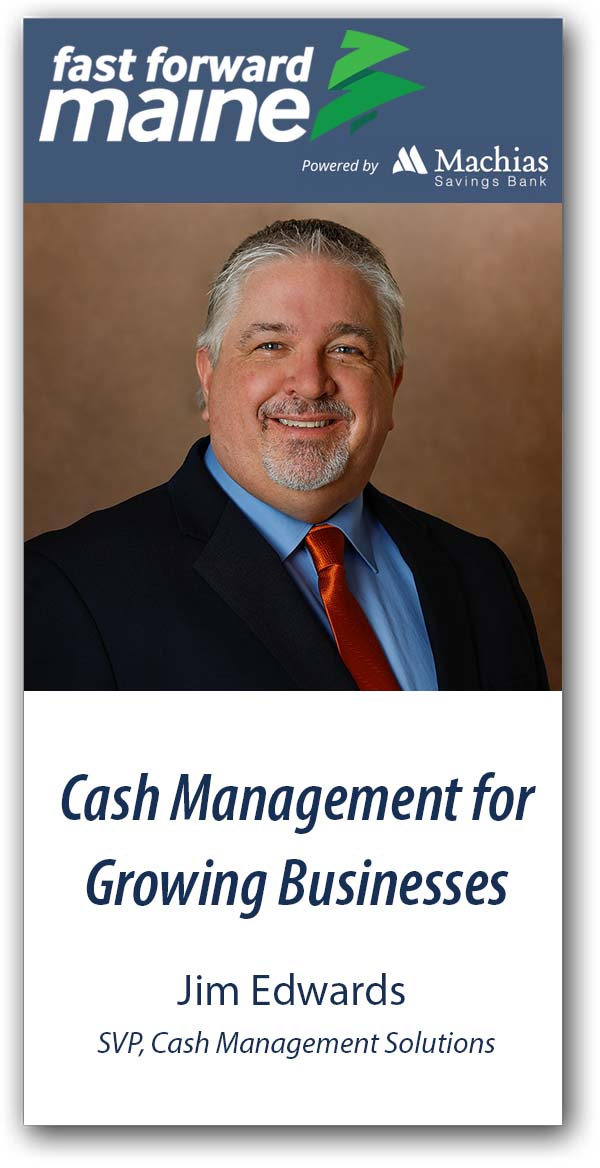
Cash management is a problem for all businesses, but especially if you’re growing. It covers a lot of ground, from taking on additional payment options, managing your accounts payable, and avoiding the evolving problem of fraud, especially cyber fraud. In today’s episode we’ll look at ways you can improve your cash management so you can grow and prosper.
Podcast: Play in new window | Download
Subscribe: RSS
Grow Your Business Through Evidence-Based Entrepreneurship
Podcast: Play in new window | Download
Subscribe: RSS
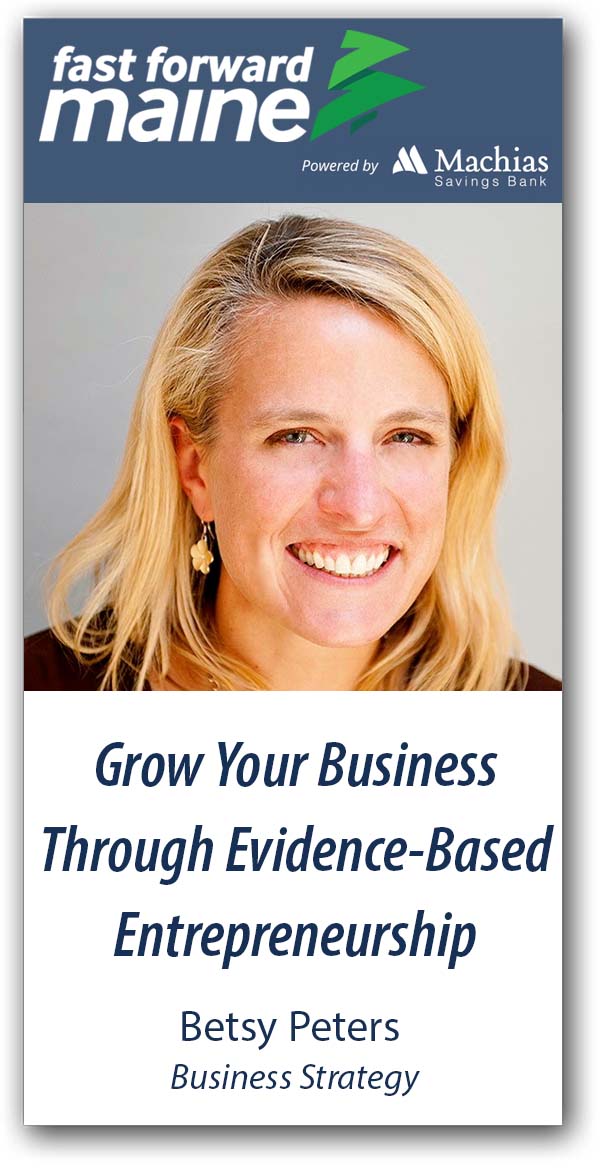
How do you scale your company here in Maine? It doesn’t happen without planning, perseverance, and evidence-based entrepreneurship. In today’s episode we’ll explore exactly what that means, and how you can ensure that the problem you’re solving is worth fixing.
Podcast: Play in new window | Download
Subscribe: RSS
How to Develop Leadership Throughout Your Company – Bo Balcavage
Podcast: Play in new window | Download
Subscribe: RSS
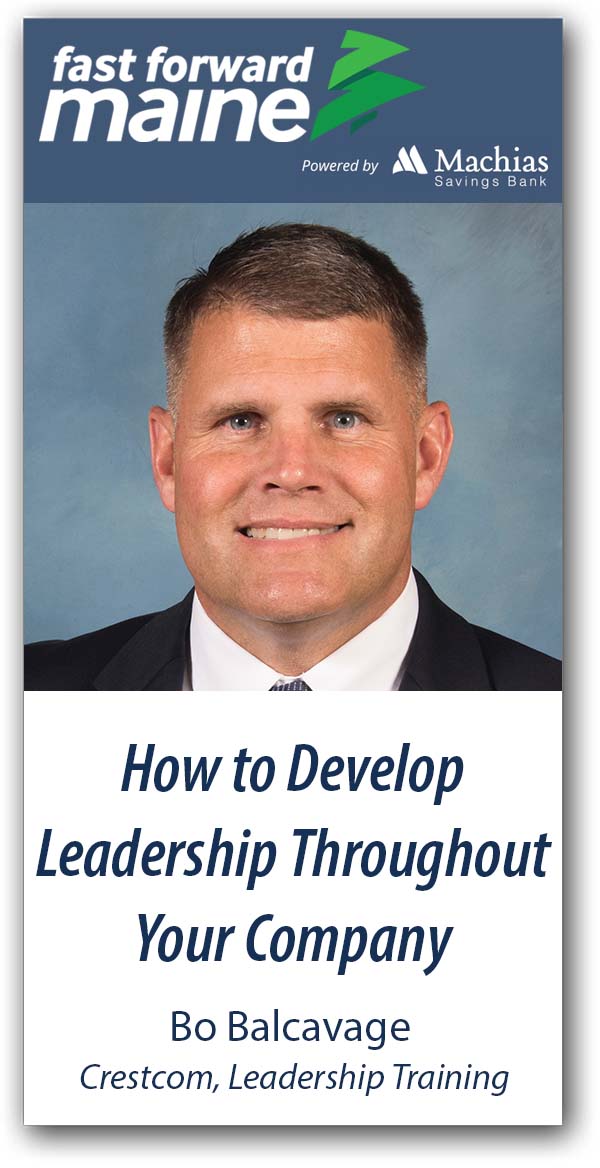
How do you view leadership inside your company? Is it top down, or are you investing in the leadership at all levels of your company? How can you create better leaders within your company, and what does that look like? We’ll tackle these questions and more with Bo Balcavage of Crestcom, a leadership training company.
Podcast: Play in new window | Download
Subscribe: RSS
How To Run Your Business With Better Systems – Priscilla Hansen Mahoney
Podcast: Play in new window | Download
Subscribe: RSS
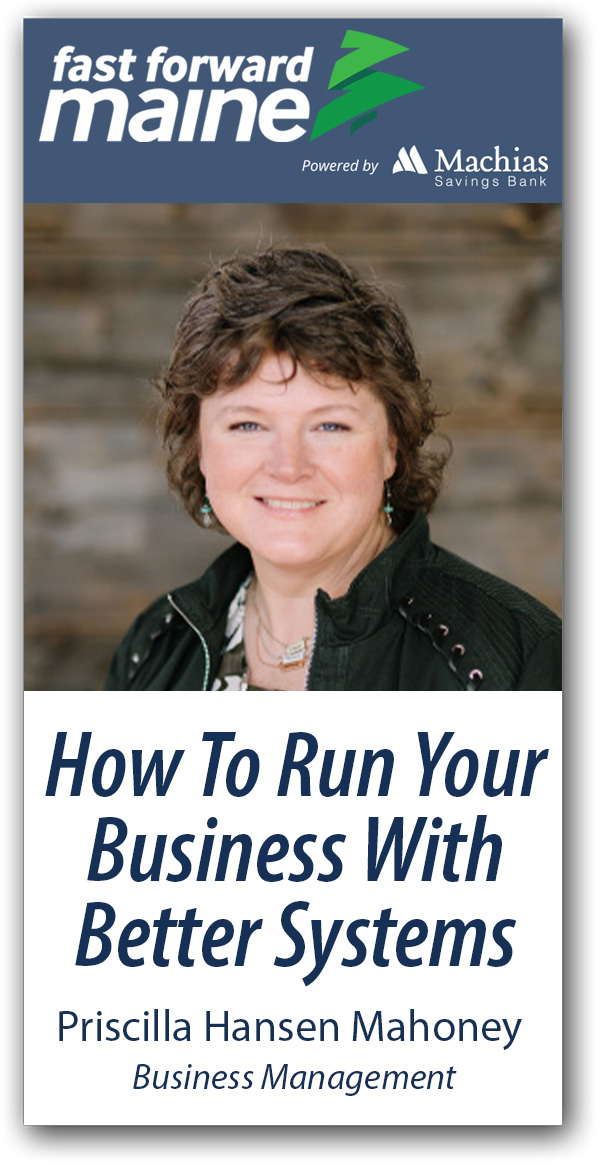
There’s so much too running a successful business…attracting customers, retaining employees, running financials, improving deliverables, managing payroll, dealing with taxes…the list never ends. That can feel overwhelming, especially when what got you here won’t get you any further. To that end, we’ll be taking a look at how to develop systems that allow you to grow your business.
Podcast: Play in new window | Download
Subscribe: RSS
LinkedIn For Business Owners – Rich Brooks
Podcast: Play in new window | Download
Subscribe: RSS
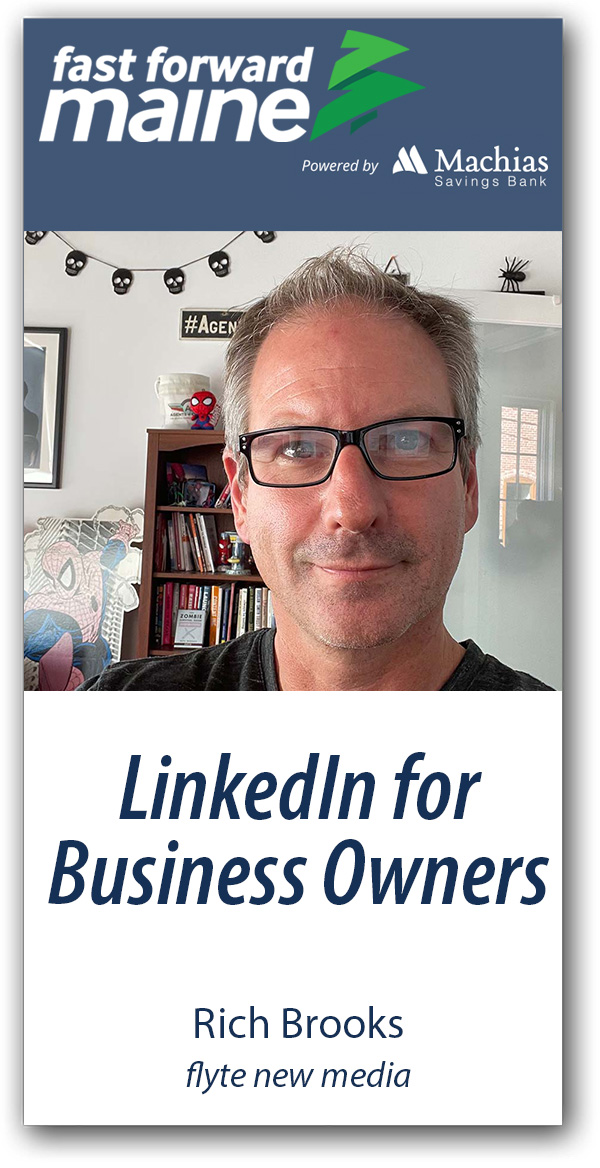
I’m a big fan of LinkedIn. I know LinkedIn isn’t cool. I recognize it’s not the birthplace of dank memes or viral videos. But when it comes to helping me grow my business, it’s one of the best, most rewarding tools out there.
And I’m only using a fraction of it.
Podcast: Play in new window | Download
Subscribe: RSS
What Owners Need to Know about Leadership – Jan Kearce
Podcast: Play in new window | Download
Subscribe: RSS
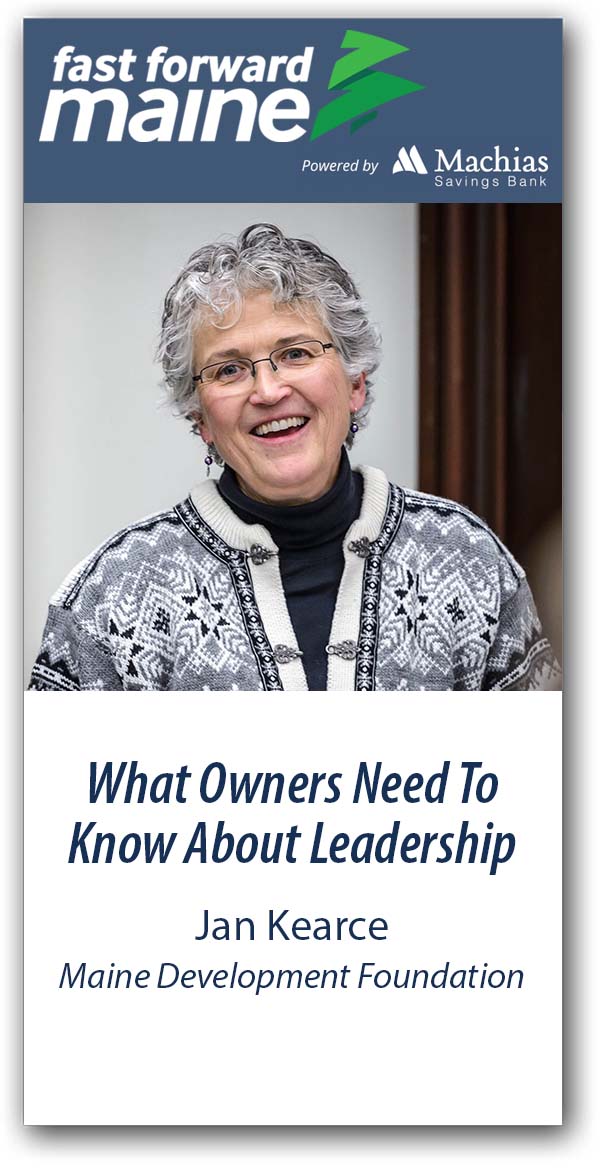
Podcast: Play in new window | Download
Subscribe: RSS
How to Zoom Better – Charles Kanozak
Podcast: Play in new window | Download
Subscribe: RSS
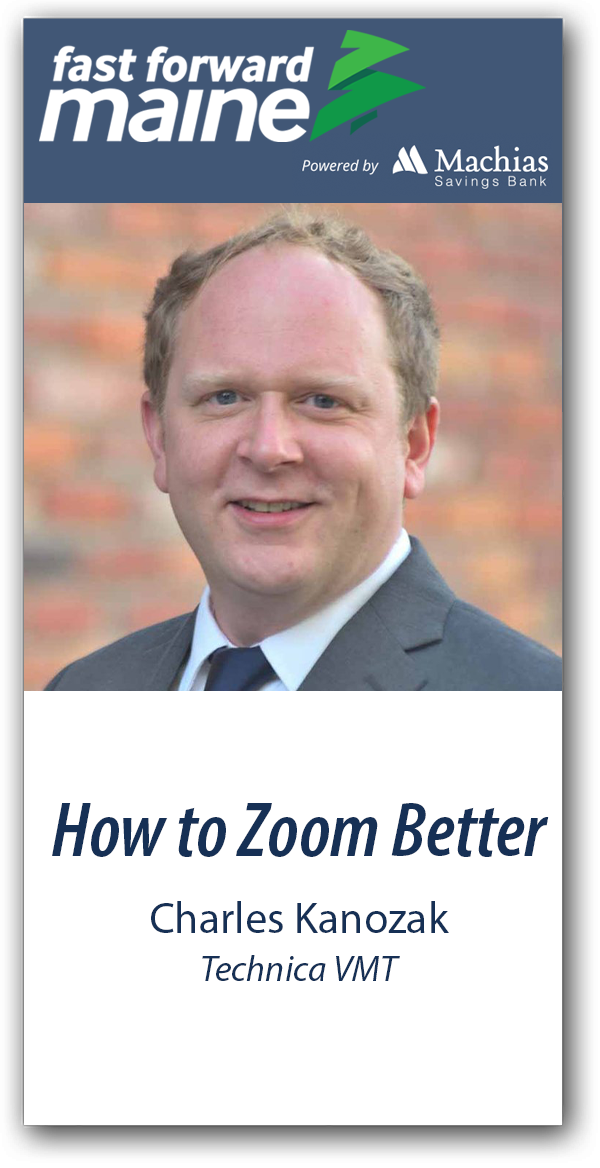 Zoom, GoToMeeting, Google Meet, and Microsoft Teams (ugh), aren’t going anywhere, so as business professionals, leaders, and owners, we need to improve our game on these video conferencing platforms.Today we hear from Charles Kanozak of Technica VMT on what you can do to host better meetings and conversations virtually.
Zoom, GoToMeeting, Google Meet, and Microsoft Teams (ugh), aren’t going anywhere, so as business professionals, leaders, and owners, we need to improve our game on these video conferencing platforms.Today we hear from Charles Kanozak of Technica VMT on what you can do to host better meetings and conversations virtually.
Podcast: Play in new window | Download
Subscribe: RSS
How to Project Your Business Financials – Raynor Large
Podcast: Play in new window | Download
Subscribe: RSS
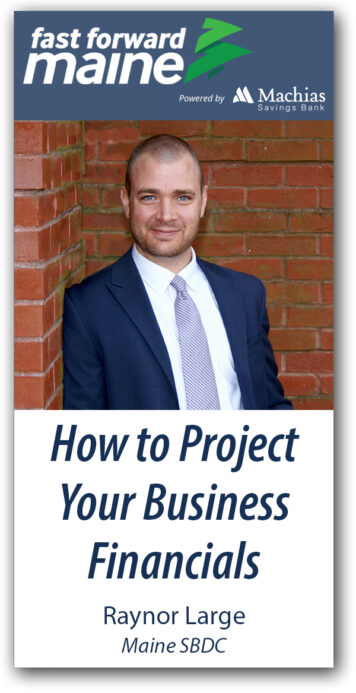 Do you know which financial reports you should be reviewing monthly, weekly, and even daily? Do you know how to run projections and forecasts of your business financials? We chat with Raynor Large from the Maine SBDC on how you can get a handle on this critical element of your business to make more informed decisions.
Do you know which financial reports you should be reviewing monthly, weekly, and even daily? Do you know how to run projections and forecasts of your business financials? We chat with Raynor Large from the Maine SBDC on how you can get a handle on this critical element of your business to make more informed decisions.
(more…)
Podcast: Play in new window | Download
Subscribe: RSS





